九位人力资源高管解读:如何在人工智能人才方面展开竞争
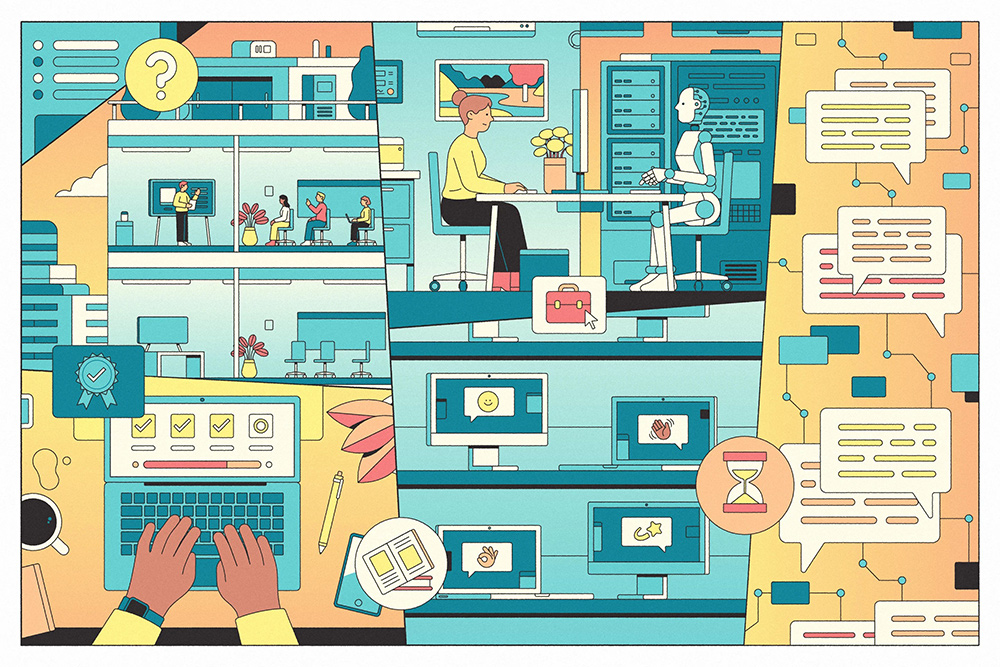
顶级人工智能人才争夺战已经打响了。
OpenAI去年11月发布的ChatGPT平台让人工智能,更具体地说是生成式人工智能,一跃成为全球关注的焦点。似乎在一夜之间,人工智能从科幻小说情节中的装置变成了职场热门话题。
对这项技术发表看法的首席执行官越来越多。特斯拉(Tesla)和SpaceX的首席执行官埃隆·马斯克表示,如果怀疑论者对人工智能的持久性和指数级增长视而不见,那么人工智能就会“像小行星一样”撞上他们。国际商用机器公司(IBM)首席执行官阿尔温德·克里希纳估计,人工智能将承担30%至50%的“重复性后台任务”。摩根大通(JPMorgan Chase)首席执行官杰米·戴蒙在致股东的年度信中认为,人工智能“对我们公司的未来至关重要”。尽管领导者们对人工智能将如何改变工作场所存在分歧,但他们一致认为人工智能未来会改变工作场所。正如《财富》杂志在上个季度的指南中所指出的那样,他们正为一项可能颠覆当前职业规范的技术做准备,包括加强精通人工智能的人才队伍建设,并对现有人才进行再培训,确保他们为未来做好充分准备。
在本季度的《财富:职场》(Fortune@ Work)中,九位人力资源高管讨论了他们如何用最新的人工智能工具方面的专家来充实自己的人才库。
鉴于我们对人工智能技术及其应用的整体理解还很有限,接受《财富》杂志采访的高管们最常提到的是:要做好准备。
人工智能人才争夺战已经打响了。
我们询问了九位高管,他们计划如何在激烈的竞争中提高员工的人工智能技能,并吸引新人才。以下是他们的回答:
为便于理解,本文略有删减。

可口可乐公司
丽莎·章,全球首席人事官
您计划如何提高员工技能,并为人工智能的未来储备人才?
最近,我们推出了企业版可口可乐ChatGPT聊天机器人,并设立了人力资源知识中心,使我们的员工能够在日常工作中使用人工智能。我们还在内部社交网络上推出了“如何利用人工智能”系列课程,帮助员工学习如何使用这些工具。
我们在市场营销领域使用人工智能,以全新的、令人兴奋的方式与消费者互动。人工智能增强了我们快速创建和迭代超个性化内容和信息的能力,并重新构想了我们生成创意内容的方式。
人工智能很强大,但它并不完美。它能增强人类的能力,但不能取代我们对员工、对员工的知识和才能的需求。

赛富时公司
娜塔莉·斯卡迪诺,招聘、入职和员工学习全球主管
您计划如何提高员工技能,并为人工智能的未来储备人才?
根据赛富时公司最近的研究,人工智能技能被认为是最急需的技能之一,但只有十分之一的员工表示他们掌握了相关技能。这意味着我们必须重新思考如何培训企业员工。首先从我们的下一代员工入手:实习生。今年,我们的未来员工暑期实习项目计划将人工智能贯穿始终,让学生有机会研究真正的人工智能解决方案。我们的目标是,在继续转变整个企业的人才培养方式的同时,快速启动实习生学习人工智能的进程。
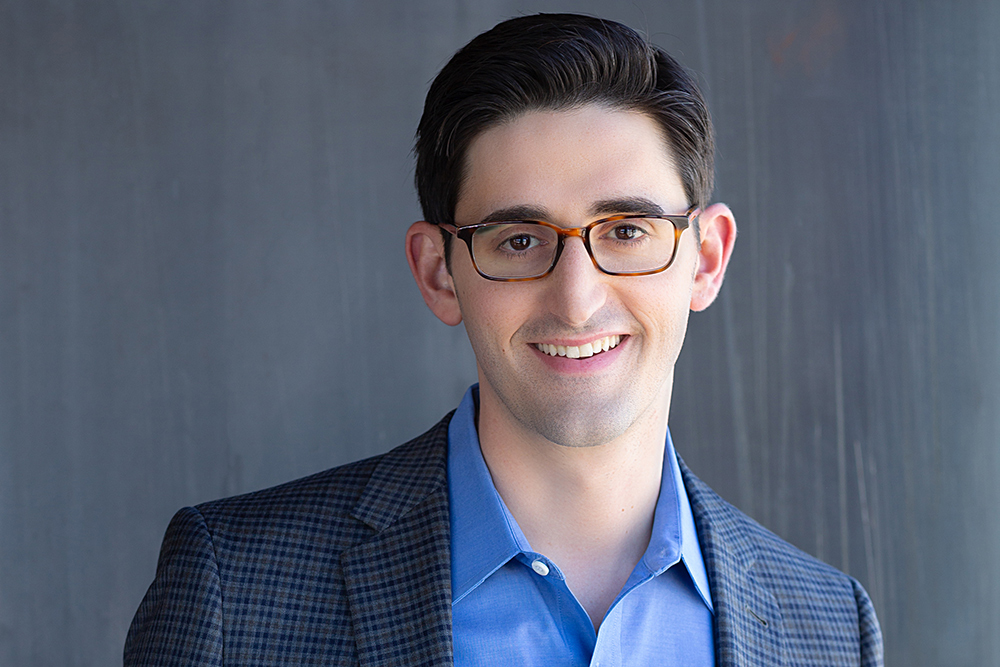
思爱普公司
麦克斯韦·韦塞尔,首席学习官
您计划如何提高员工技能,并为人工智能的未来储备人才?
随着人工智能越来越多地融入到日常工作中,专业人士必须了解编码基础知识。当平民开发者能够处理更复杂的事情时,精通技术的计算机和数据科学家就可以腾出手来,更多地专注于那些需要深入了解系统工作原理的问题。
关键是要提供针对平民开发者和低代码、无代码综合技能人士的培训和开发课程,以及针对高技术人才的培训和开发课程。平民开发者可能不需要编写那么多代码,但需要具备产品管理、设计和用户研究能力,以发挥他们研发的新工具的最大效能。与此同时,技术专家将转向战略性思维,并演变为机器学习工程师和人工智能分析师等新兴角色。企业必须提供学习机会来为基础技术和新兴技术领域人才提供支持,以满足不断增长的创新需求。

美国家庭人寿保险公司
马修·欧文比,首席人事官
您计划如何提高员工技能,并为人工智能的未来储备人才?
从人才招聘的角度来看,我们对人工智能及其对人才的影响持观望态度。在美国家庭人寿保险公司,我们利用人工智能来完成许多重复性流程和程序,这为我们的“人力”资源创造了带宽。我的观点是,人工智能将颠覆人才组合的“边界”,这意味着输入和输出变化较小的职位以及基本的编程职位可以部分或完全实现自动化,人工智能还将颠覆数据分析或预测建模等职位要求的高端技能组合。但从本质上讲,我们所在的行业经常在人们最水深火热的时候与他们进行互动,因此,虽然技术会帮助我们加快流程和程序,但没有什么能取代人与人之间的接触。
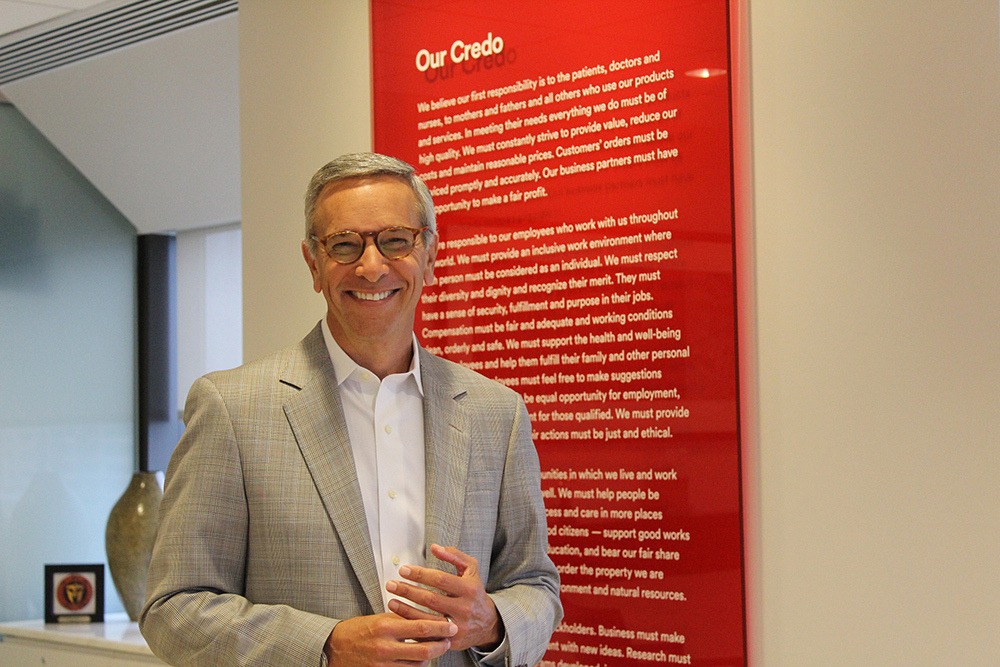
强生公司
彼得·法索洛,首席人事官
您计划如何提高员工技能,并为人工智能的未来储备人才?
我们双管齐下,以数据科学为先导,将提高强生员工的技能作为整个企业的优先事项,并积极招募人工智能人才,以加速创新。我们的首要任务是建立一个数字创新者生态系统,通过开发有效的医疗保健解决方案来释放人工智能的潜力。例如,在杨森制药研发部门的研发中,数据科学是核心竞争力,并从根本上决定了我们如何在整个产品线中进行创新。我们在短短几年内就建立了一支精通数据和医学科学的优秀制药研发团队。我们对数字人才管道的投资已经从讨论数据科学的潜力转向对加速变革性药物(可能会对患者产生深远影响)开发产生实际影响。
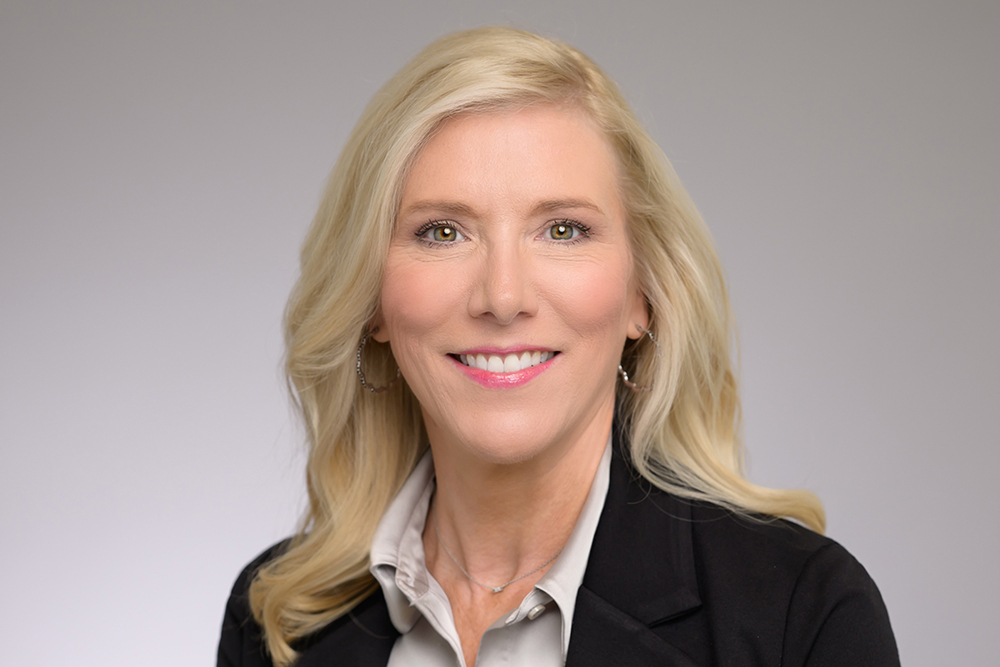
赛默飞世尔科技公司
丽莎·布里特,首席人事官
您计划如何提高员工技能,并为人工智能的未来储备人才?
我们相信,有无限的机会可以使用生成式人工智能来进一步实现创新,并让同事们提高能力,从而专注于完成能够创造最大价值的工作。从人才的角度来看,同事们将学会利用这项新技术,同时保护机密信息和知识产权。具体来说,需要的新兴技能是熟练地创建提示,同时还要具备验证输出和提高输出准确性的专业知识。我们已经成立了一个内部团队,专注于提高同事们在生成式人工智能和相关风险方面的技能。我们还广泛提供人工智能、机器学习和自然语言处理方面的入门课程。

Workday公司
阿什利·戈德史密斯,首席人事官
您计划如何提高员工技能,并为人工智能的未来储备人才?
我们一直在关注员工掌握了哪些技能,以及我们在哪些方面可能存在差距。有了这些信息,我们就知道应该把技能提高工作的重点放在哪里,以及如何将员工与关键项目、临时工作甚至新职位等机会联系起来。例如,我们正在使用一个内部平台——一个具有嵌入式人工智能和机器学习功能的开放、互联的技能智能基础平台——来帮助员工了解有哪些机会向他们敞开大门,或者他们需要在哪些方面培养新技能,以进入Workday的下一个职位,并实现晋升。与此同时,这使Workday领导者能够更实时地了解全球劳动力能力,并有助于我们掌握包括人工智能和机器学习在内的关键技能,从而在这一快速的人才转型进程中保持领先地位。

诺斯罗普·格鲁曼公司
安·艾迪生,首席人事官
您计划如何提高员工技能,并为人工智能的未来储备人才?
持续提升技能——从生产车间到领导层——是重中之重。我们通过与大学和技术思想领袖合作,为员工提供最新知识。例如,我们最近为员工提供了斯坦福大学(Stanford University)研究生水平的人工智能专业课程。我们还通过内部学习门户拓宽了先进技术产品,并投资于学习途径,以帮助培养前程似锦的人工智能领导者。诺斯罗普·格鲁曼公司目前与100多所大学、学院和研究院合作,以促进国家安全最紧缺领域的人才的技能发展,包括传感器、高超声速、量子计算、网络和人工智能。
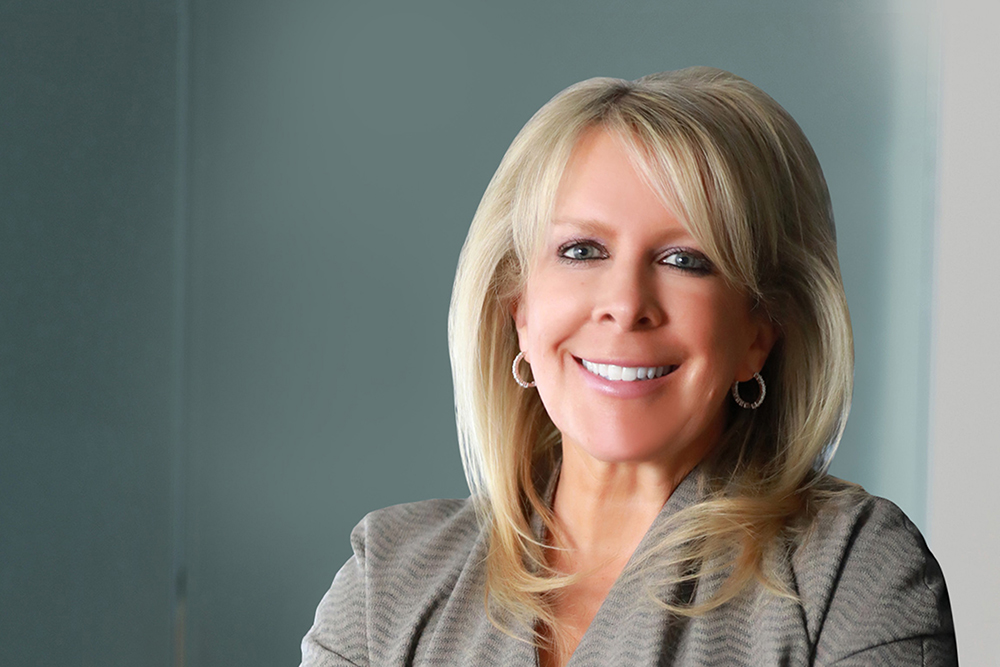
爱克斯龙公司
艾米·贝斯特,首席人事官
您计划如何提高员工技能,并为人工智能的未来储备人才?
你可能认为我们是一家基础设施公司,但爱克斯龙公司也是一家科技公司。向数百万家庭提供能源需要复杂的系统,也需要具备有效操作这些系统的专业知识的人才。我们需要精通各种形式的技术,我们正努力了解人工智能方面的机会,从预测性维护到客户数据分析。我们招聘聚焦员工是否具有保持领先于先进技术的能力。我们还有一个正式的创新计划,鼓励员工进行创造性地思考,并挑战现有方法。随着人工智能的普及,培养这种文化将变得愈加重要。我们还关注在技术领域代表性不足的群体,并在我们所服务的社区建立人才梯队,以便更好地应对未来的挑战。 (财富中文网)
译者:中慧言-王芳
顶级人工智能人才争夺战已经打响了。
OpenAI去年11月发布的ChatGPT平台让人工智能,更具体地说是生成式人工智能,一跃成为全球关注的焦点。似乎在一夜之间,人工智能从科幻小说情节中的装置变成了职场热门话题。
对这项技术发表看法的首席执行官越来越多。特斯拉(Tesla)和SpaceX的首席执行官埃隆·马斯克表示,如果怀疑论者对人工智能的持久性和指数级增长视而不见,那么人工智能就会“像小行星一样”撞上他们。国际商用机器公司(IBM)首席执行官阿尔温德·克里希纳估计,人工智能将承担30%至50%的“重复性后台任务”。摩根大通(JPMorgan Chase)首席执行官杰米·戴蒙在致股东的年度信中认为,人工智能“对我们公司的未来至关重要”。尽管领导者们对人工智能将如何改变工作场所存在分歧,但他们一致认为人工智能未来会改变工作场所。正如《财富》杂志在上个季度的指南中所指出的那样,他们正为一项可能颠覆当前职业规范的技术做准备,包括加强精通人工智能的人才队伍建设,并对现有人才进行再培训,确保他们为未来做好充分准备。
在本季度的《财富:职场》(Fortune@ Work)中,九位人力资源高管讨论了他们如何用最新的人工智能工具方面的专家来充实自己的人才库。
鉴于我们对人工智能技术及其应用的整体理解还很有限,接受《财富》杂志采访的高管们最常提到的是:要做好准备。
人工智能人才争夺战已经打响了。
我们询问了九位高管,他们计划如何在激烈的竞争中提高员工的人工智能技能,并吸引新人才。以下是他们的回答:
为便于理解,本文略有删减。
可口可乐公司
丽莎·章,全球首席人事官
您计划如何提高员工技能,并为人工智能的未来储备人才?
最近,我们推出了企业版可口可乐ChatGPT聊天机器人,并设立了人力资源知识中心,使我们的员工能够在日常工作中使用人工智能。我们还在内部社交网络上推出了“如何利用人工智能”系列课程,帮助员工学习如何使用这些工具。
我们在市场营销领域使用人工智能,以全新的、令人兴奋的方式与消费者互动。人工智能增强了我们快速创建和迭代超个性化内容和信息的能力,并重新构想了我们生成创意内容的方式。
人工智能很强大,但它并不完美。它能增强人类的能力,但不能取代我们对员工、对员工的知识和才能的需求。
赛富时公司
娜塔莉·斯卡迪诺,招聘、入职和员工学习全球主管
您计划如何提高员工技能,并为人工智能的未来储备人才?
根据赛富时公司最近的研究,人工智能技能被认为是最急需的技能之一,但只有十分之一的员工表示他们掌握了相关技能。这意味着我们必须重新思考如何培训企业员工。首先从我们的下一代员工入手:实习生。今年,我们的未来员工暑期实习项目计划将人工智能贯穿始终,让学生有机会研究真正的人工智能解决方案。我们的目标是,在继续转变整个企业的人才培养方式的同时,快速启动实习生学习人工智能的进程。
思爱普公司
麦克斯韦·韦塞尔,首席学习官
您计划如何提高员工技能,并为人工智能的未来储备人才?
随着人工智能越来越多地融入到日常工作中,专业人士必须了解编码基础知识。当平民开发者能够处理更复杂的事情时,精通技术的计算机和数据科学家就可以腾出手来,更多地专注于那些需要深入了解系统工作原理的问题。
关键是要提供针对平民开发者和低代码、无代码综合技能人士的培训和开发课程,以及针对高技术人才的培训和开发课程。平民开发者可能不需要编写那么多代码,但需要具备产品管理、设计和用户研究能力,以发挥他们研发的新工具的最大效能。与此同时,技术专家将转向战略性思维,并演变为机器学习工程师和人工智能分析师等新兴角色。企业必须提供学习机会来为基础技术和新兴技术领域人才提供支持,以满足不断增长的创新需求。
美国家庭人寿保险公司
马修·欧文比,首席人事官
您计划如何提高员工技能,并为人工智能的未来储备人才?
从人才招聘的角度来看,我们对人工智能及其对人才的影响持观望态度。在美国家庭人寿保险公司,我们利用人工智能来完成许多重复性流程和程序,这为我们的“人力”资源创造了带宽。我的观点是,人工智能将颠覆人才组合的“边界”,这意味着输入和输出变化较小的职位以及基本的编程职位可以部分或完全实现自动化,人工智能还将颠覆数据分析或预测建模等职位要求的高端技能组合。但从本质上讲,我们所在的行业经常在人们最水深火热的时候与他们进行互动,因此,虽然技术会帮助我们加快流程和程序,但没有什么能取代人与人之间的接触。
强生公司
彼得·法索洛,首席人事官
您计划如何提高员工技能,并为人工智能的未来储备人才?
我们双管齐下,以数据科学为先导,将提高强生员工的技能作为整个企业的优先事项,并积极招募人工智能人才,以加速创新。我们的首要任务是建立一个数字创新者生态系统,通过开发有效的医疗保健解决方案来释放人工智能的潜力。例如,在杨森制药研发部门的研发中,数据科学是核心竞争力,并从根本上决定了我们如何在整个产品线中进行创新。我们在短短几年内就建立了一支精通数据和医学科学的优秀制药研发团队。我们对数字人才管道的投资已经从讨论数据科学的潜力转向对加速变革性药物(可能会对患者产生深远影响)开发产生实际影响。
赛默飞世尔科技公司
丽莎·布里特,首席人事官
您计划如何提高员工技能,并为人工智能的未来储备人才?
我们相信,有无限的机会可以使用生成式人工智能来进一步实现创新,并让同事们提高能力,从而专注于完成能够创造最大价值的工作。从人才的角度来看,同事们将学会利用这项新技术,同时保护机密信息和知识产权。具体来说,需要的新兴技能是熟练地创建提示,同时还要具备验证输出和提高输出准确性的专业知识。我们已经成立了一个内部团队,专注于提高同事们在生成式人工智能和相关风险方面的技能。我们还广泛提供人工智能、机器学习和自然语言处理方面的入门课程。
Workday公司
阿什利·戈德史密斯,首席人事官
您计划如何提高员工技能,并为人工智能的未来储备人才?
我们一直在关注员工掌握了哪些技能,以及我们在哪些方面可能存在差距。有了这些信息,我们就知道应该把技能提高工作的重点放在哪里,以及如何将员工与关键项目、临时工作甚至新职位等机会联系起来。例如,我们正在使用一个内部平台——一个具有嵌入式人工智能和机器学习功能的开放、互联的技能智能基础平台——来帮助员工了解有哪些机会向他们敞开大门,或者他们需要在哪些方面培养新技能,以进入Workday的下一个职位,并实现晋升。与此同时,这使Workday领导者能够更实时地了解全球劳动力能力,并有助于我们掌握包括人工智能和机器学习在内的关键技能,从而在这一快速的人才转型进程中保持领先地位。
诺斯罗普·格鲁曼公司
安·艾迪生,首席人事官
您计划如何提高员工技能,并为人工智能的未来储备人才?
持续提升技能——从生产车间到领导层——是重中之重。我们通过与大学和技术思想领袖合作,为员工提供最新知识。例如,我们最近为员工提供了斯坦福大学(Stanford University)研究生水平的人工智能专业课程。我们还通过内部学习门户拓宽了先进技术产品,并投资于学习途径,以帮助培养前程似锦的人工智能领导者。诺斯罗普·格鲁曼公司目前与100多所大学、学院和研究院合作,以促进国家安全最紧缺领域的人才的技能发展,包括传感器、高超声速、量子计算、网络和人工智能。
爱克斯龙公司
艾米·贝斯特,首席人事官
您计划如何提高员工技能,并为人工智能的未来储备人才?
你可能认为我们是一家基础设施公司,但爱克斯龙公司也是一家科技公司。向数百万家庭提供能源需要复杂的系统,也需要具备有效操作这些系统的专业知识的人才。我们需要精通各种形式的技术,我们正努力了解人工智能方面的机会,从预测性维护到客户数据分析。我们招聘聚焦员工是否具有保持领先于先进技术的能力。我们还有一个正式的创新计划,鼓励员工进行创造性地思考,并挑战现有方法。随着人工智能的普及,培养这种文化将变得愈加重要。我们还关注在技术领域代表性不足的群体,并在我们所服务的社区建立人才梯队,以便更好地应对未来的挑战。 (财富中文网)
译者:中慧言-王芳
The race for top A.I. talent is on.
OpenAI’s November release of its ChatGPT platform catapulted artificial intelligence, and more specifically generative A.I., into the global consciousness. Seemingly overnight, A.I. went from a sci-fi plot device to a workplace hot topic.
The list of CEOs weighing in on the technology grows longer by the day. Tesla and SpaceX CEO Elon Musk said A.I. would hit skeptics “like an asteroid” if they buried their heads in the sand about its permanence and exponential growth. IBM CEO Arvind Krishna estimated it would assume between 30% to 50% of “repetitive back-office tasks.” And in his annual letter to shareholders, JPMorgan Chase CEO Jamie Dimon deemed it “critical to our company’s future.” Though leaders differ on how A.I. will transform the workplace, they agree that it will. And they’re preparing for a technology that could upend current professional norms by ramping up talent well-versed in A.I. and reskilling current talent to ensure they’re well-equipped for the future, as Fortune noted in last quarter’s playbook.
For this quarter’s edition of Fortune @ Work, nine human resources executives discussed how they’re stocking their talent pool with experts in newly minted A.I. tools.
Given that our collective understanding of the technology and its applications is still quite limited in scope, the most common refrain from executives who spoke to Fortune is an emphasis on preparation.
The A.I. talent race is on.
We asked nine executives how they plan to upskill employees in A.I. and attract new talent amid head-to-head competition. Here’s what they told us:
This article has been edited for length and clarity.
The Coca-Cola Co.
Lisa Chang, global chief people officer
How do you plan to upskill employees and secure talent for the future of A.I.?
Recently, we launched an enterprise version of Coca-Cola ChatGPT and an HR knowledge hub to enable our people to use A.I. in their day-to-day work. We also launched a “Leveraging A.I.” series on our internal social network with courses to help associates learn how to use these tools.
We’re using A.I. in our marketing function to engage with consumers in new and exciting ways. A.I. amplifies our ability to rapidly create and iterate on hyper-personalized content and messaging and reimagine how we produce creative content.
A.I. is powerful, but it’s not perfect. It is an enhancer of human capability but does not replace our need for people, their knowledge, and talents.
Salesforce
Nathalie Scardino, global head of recruiting, onboarding, and employee learning
How do you plan to upskill employees and secure talent for the future of A.I.?
A.I. skills were cited as some of the most in demand, according to recent Salesforce research, but only one in 10 workers said they have those skills. That means we have to reimagine how we train and develop every part of our organization, starting with the next generation of our workforce: interns. This year, our Futureforce summer intern program will infuse A.I. throughout, giving students the opportunity to work on real A.I. solutions. The goal is to jump-start A.I. learning with this group as we continue transforming talent development across the organization.
SAP
Maxwell Wessel, chief learning officer
How do you plan to upskill employees and secure talent for the future of A.I.?
As A.I. becomes more integrated into workday tasks, professionals must understand the foundations of coding. When citizen developers can tackle ever more complex things, deeply technical computer and data scientists are freed up to focus more on issues that require an in-depth understanding of how the systems work.
It’s critical to provide training and development courses focused on citizen developers and low-code, no-code skill sets, as well as those geared for highly technical roles. Citizen developers may not need to code as much but will require product management, design, and user research capabilities to get the most out of their new tools. Meanwhile, tech pros will shift into more strategic thinking and evolve into emerging roles such as machine learning engineers and A.I. analysts. Organizations must provide learning opportunities to support both the basic and emerging areas of technology in order to feed increased innovation.
Aflac
Matthew Owenby, chief human resources officer
How do you plan to upskill employees and secure talent for the future of A.I.?
From a talent recruitment perspective, we are taking a wait-and-see approach to A.I. and talent impacts. At Aflac, we utilize A.I. for many of our repetitive processes and programs, which creates bandwidth for our “human” resources. My view is that A.I. will be disruptive at the “edges” of a talent portfolio, meaning roles that can be partially or fully automated with low variation in input and outcome, basic programming activities, and at the higher end of the skills portfolio in data analytics or predictive modeling positions. But we are, at our core, an industry that interacts with people often during their most difficult times, so while technology will help us accelerate our processes and procedures, nothing will ever replace a human touch.
Johnson & Johnson
Peter Fasolo, chief human resources officer
How do you plan to upskill employees and secure talent for the future of A.I.?
Our two-pronged approach to leading with data science focuses on upskilling J&J employees as an enterprise-wide priority and actively recruiting A.I. talent to accelerate innovation. Our priority is to build an ecosystem of digital innovators who unleash the promise of A.I. by developing effective health care solutions. For example, in Janssen research and development, our pharmaceutical R&D arm, data science is embedded as a core competency and fundamentally shapes how we innovate across our pipeline. We’ve established a talented pharmaceutical R&D team skilled in data and medical science in just a few years. Investments in our digital talent pipeline have shifted from discussing the potential of data science to the actionable impact of accelerating the development of transformative medicines that could deliver profound patient impact.
Thermo Fisher Scientific
Lisa Britt, chief human resources officer
How do you plan to upskill employees and secure talent for the future of A.I.?
We believe there are endless opportunities to use generative A.I. to help us further innovate and create the capacity for our colleagues to focus on work with the greatest impact. From a talent perspective, colleagues will learn to leverage this new technology while protecting our confidential information and intellectual property. Specifically, the emerging skills required are skilled prompt creation balanced with expertise to validate and refine outcome accuracy. We already have an internal team focused on upskilling our colleagues on generative A.I. and the associated risks. We also broadly offer introductory courses on A.I., machine learning, and natural language processing.
Workday
Ashley Goldsmith, chief people officer
How do you plan to upskill employees and secure talent for the future of A.I.?
We’re always looking at what skills exist within our workforce and where we might have gaps. With this information, we know where to focus our upskilling efforts and how to connect employees to opportunities such as key projects, gigs, or even new roles. For example, we’re using an internal platform—an open, interconnected skills intelligence foundation with embedded A.I. and machine learning—to help employees see what opportunities are open to them or where they need to develop new skills to get into their next role within Workday and grow their career. At the same time, this gives our Workday leaders more real-time insight into our global workforce capabilities and helps ensure we have critical skills, including A.I. and machine learning, to remain at the forefront of this rapid talent shift.
Northrop Grumman
Ann Addison, chief human resources officer
How do you plan to upskill employees and secure talent for the future of A.I.?
Continual upskilling—from the manufacturing floor to leadership—is a top priority. We’re bringing the most up-to-date learnings to our workforce through partnerships with universities and tech thought leaders. For example, we recently offered employees a graduate-level Stanford University A.I. professional program. We also broadened our advanced technology offerings through our internal learning portal and invested in learning pathways to help develop up-and-coming A.I. leaders. Northrop Grumman currently partners with over 100 universities, colleges, and grade schools to promote skill development in the most high-demand areas of national security, including sensors, hypersonics, quantum computing, cyber, and A.I.
Exelon
Amy Best, chief human resources officer
How do you plan to upskill employees and secure talent for the future of A.I.?
You may think of us as an infrastructure company, but Exelon is also a technology company. Delivering energy to millions of homes requires complex systems and people with the expertise to operate them effectively. We need to be adept at all forms of technology, and we are working to understand the opportunities for A.I., from predictive maintenance to customer data analytics. The capacity to stay ahead of advancing technology is already a focus of our recruiting. We also have a formal innovation program to encourage employees to think creatively and challenge current approaches. Nurturing this culture will be important as A.I. becomes more commonplace. We’re also focusing on groups that have been underrepresented in technology fields and building a pipeline from the communities we serve to better prepare for future challenges.













